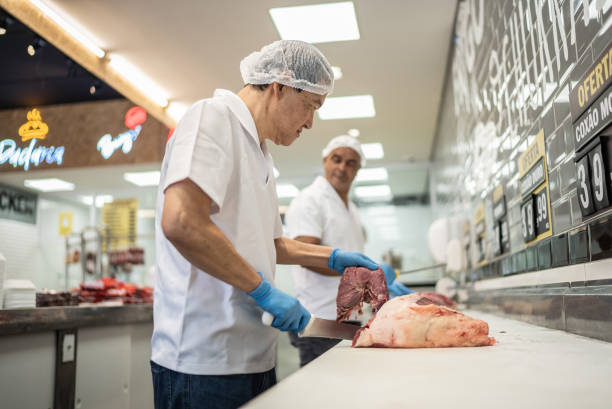Frequently Asked Questions
What is the role of a retail meat cutter?
A retail meat cutter is tasked with the preparation and division of meat products for retail sale. This involves precise cutting, meticulous trimming, and packaging of meat to meet both customer specifications and stringent quality standards.
🌍How ready are you?
What qualifications are necessary to become a retail meat cutter?
Typically, qualifications involve on-the-job training, although certain employers may prefer candidates with a culinary arts background or a related field. Vital skills encompass adept knife handling, meticulous attention to detail, and a comprehensive understanding of various meat cuts.
What are the primary duties of a retail meat cutter?
Retail meat cutters shoulder responsibilities such as the meticulous cutting and preparation of meat products, upholding cleanliness and hygiene in the cutting area, ensuring proper meat storage, guiding customers in their meat selections, and adhering rigorously to safety and sanitation regulations.
How does a retail meat cutter guarantee meat quality?
Ensuring meat quality involves retail meat cutters scrutinizing products for freshness, appropriate color, and desirable marbling. Strict adherence to proper storage and handling procedures is maintained to prevent contamination and uphold overall meat quality.
Is proficient knife handling crucial for a retail meat cutter?
Indeed, adept knife handling stands as a crucial skill for a retail meat cutter. Proficiency in using a variety of knives to precisely and efficiently cut and portion different meat types is imperative.
Can a retail meat cutter adapt to diverse retail environments?
Certainly, retail meat cutters can adapt to various settings, including grocery stores, butcher shops, specialty meat markets, and supermarkets. Specific duties may fluctuate depending on the nature of the establishment.
What safety precautions do retail meat cutters observe?
Stringent safety measures are followed by retail meat cutters, encompassing the use of personal protective equipment (PPE), proper handling and disposal of sharp tools, compliance with food safety regulations, and regular cleaning and sanitization of work surfaces and equipment.
How does a retail meat cutter assist customers?
Retail meat cutters assist customers by furnishing information about different meat cuts, providing recommendations based on customer preferences, and fulfilling specific requests for custom cuts. Their pivotal role contributes significantly to ensuring customer satisfaction.
Can retail meat cutters specialize in specific meat types?
Indeed, some retail meat cutters may specialize in particular meat types such as beef, pork, poultry, or seafood. The choice of specialization often depends on the employer’s needs and the cutter’s expertise.
Are there avenues for career progression for retail meat cutters?
Absolutely, retail meat cutters can advance in their careers by accumulating additional experience, assuming supervisory roles, or pursuing further training in meat processing and management.
Conclusion
In conclusion, a retail meat cutter is a skilled professional responsible for meticulously preparing, cutting, and packaging meat for retail sale. Proficiency in knife handling, attention to detail, and adherence to safety measures are crucial. With opportunities for specialization and career advancement, these experts play a vital role in ensuring meat quality and customer satisfaction across various retail settings.






